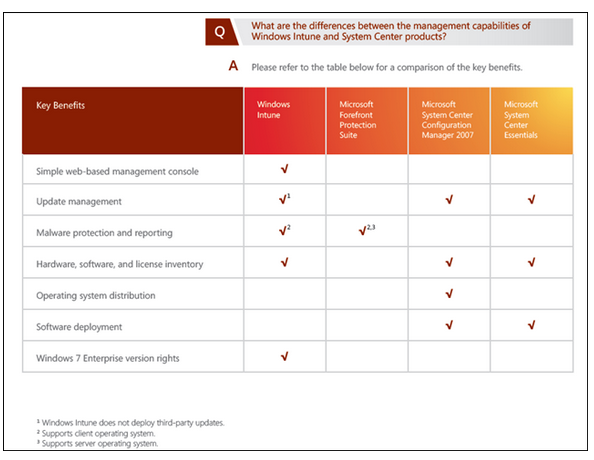Microsoft's Windows Intune cloud management service: 10 questions answered

Microsoft is making one of its new hybrid cloud/on-premise products -- Windows Intune -- commercially available as of March 23.
Windows Intune is a PC security and management service that also includes Windows 7 Enterprise client software as part of the bundle. The Windows and Windows management tools run on users' PCs and are supplemented by a cloud management and security service.
Here are 10 things Microsoft customers, potential customers and/or partners may want to know about Microsoft's newest Windows-related product. Q: Where did Windows Intune come from? Is it a Version 1 product? A: Windows Intune, codenamed "Florida," is the successor to Microsoft's System Center Online Desktop Manager, a product which Microsoft never actually released, but which its executives talked up considerably back in 2009. Windows Intune is an updated, reworked update to the SCODM offering. Microsoft released the first public Windows Intune beta in April 2010 and a second in July 2010.
Q: Who is the target audience for Windows Intune? A: Microsoft is positioning the product as a PC (not server) management product aimed primarily at SMB customers who don't currently have a PC management system in place.
Q: How much does Windows Intune cost? A: Microsoft execs have said Intune will cost $11 per seat, per month, which includes the management service, as well as Windows 7 Enterprise upgrade rights, enabling users with a version of Windows Business, Professional, Ultimate, or Enterprise already installed to move up to the Enterprise version of Windows 7. For $1 per user per month more, users can get the Microsoft Desktop Optimization Pack (MDOP) of on-premises tools, as well.
Q: Microsoft has touted Windows Intune as providing users with some technologies -- like the Enterprise version of Windows 7 and MDOP tools -- that only those who sign Software Assurance licenses have been able to get to date. What if a user already is a Software Assurance licensee? Can he/she still purchase Windows Intune? A: "Current Windows SA customers are eligible to get Windows Intune at a reduced price," according to Microsoft. Software Assurance licensees "will be billed at a lower price so that they do not pay twice for the upgrade rights included in Windows Intune." (There's no word in Microsoft's FAQ documenation as to what that price is.)
Q: Can Windows Intune manage and secure Windows XP machines? A: Surprisingly, the answer is yes. Windows Intune runs on Windows 7 Enterprise, Ultimate, and Professional; Windows Vista Enterprise, Ultimate, and Business; and Windows XP Professional with Service Pack (SP) 2 or later (SP3 recommended). If you are running it on XP SP2 clients, you also need to have installed Forefront Client Security Filter Manager QFE for Windows XP/SP2 and Microsoft Core XML Services (MSXML) 6.0. Q: What's the difference between Windows Intune, the Microsoft Update Service and Windows Server Update Service mechanisms? A: According to Microsoft, Windows Intune provides the same list of updates as the Windows Software Update Service (WSUS), with the same level of control. "Windows Intune works over the cloud like Windows Update and Microsoft Update, but you don’t need on-site infrastructure. Updates are delivered directly to any of your managed PCs that have an Internet connection."
Q: Does Windows Intune overlap, in terms of functionality, with Microsoft's Forefront Endpoint Protection product? A: "The endpoint protection included in Windows Intune is powered by the same Microsoft Malware Protection Engine used by Forefront Endpoint Protection and can deliver alerts and infection reports in a similar manner," company officials say. Windows Intune does provide some of the same functionality as Forefront Endpoint Protection 2010 business security product.
Q: Does Windows Intune obviate the need for whatever kind of antivirus software a customer may already be running? A: Microsoft says Windows Intune can be used to replace whatever a user is employing for malware protection. "This (replacement) is the recommended approach, because it will give access to the centralized malware protection policies and reporting of Windows Intune," Microsoft is telling customers and partners.
Here's a handy chart that compares existing Microsoft System Center products to Windows Intune, courtesy of Microsoft blogger Rob Waggoner:
(click on the chart to enlarge)
Q: Does Windows Intune conflict with any other management products users may have running on their Windows PCs? A: Microsoft doesn't allow users to run the Windows Intune client and the System Center Confi guration Manager client on the same machine. The Softies said they are not aware of any technical conflicts that would inhibit Windows Intune from working with other PC management suites.
Q: Where can users download a trial version of Windows Intune? A: Customers can sign-up for their free 30-day trial of the Windows Intune cloud service, at https://mocp.microsoftonline.com/Site/services/intune/Signup.aspx?offer=winintune. Or partners can initiate the trial version on behalf of their customers.
What else are you curious about regarding Windows Intune? Anyone out there interested in kicking the tires? Why/why not?
